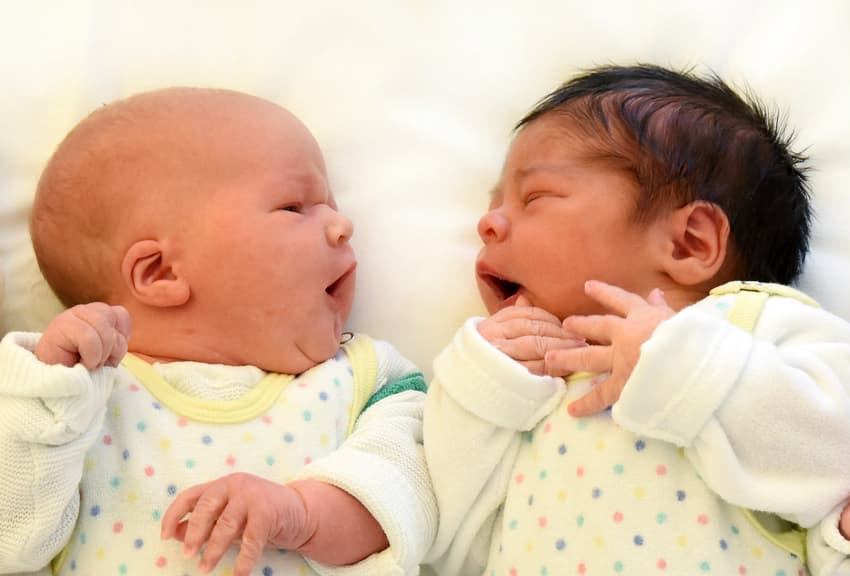German birth rate surges to highest level in over four decades

Germans have gained a reputation of late for the reluctance to have kids. But a dramatic increase in pregnancies among migrant women has helped push the birth rate up to a level not seen in four decades.
In 2016 a total of 792,131 children were born in Germany, the Federal Statistics Office confirmed on Wednesday. That number was a seven percent increase from 2015 when 737,575 newborns were registered.
It also pushed up the birth rate to 1.59 children per woman, a level not seen since 1973. In 2015 the birth rate lay somewhat lower at 1.5 children per woman.
While births among German mothers rose moderately, a dramatic rise in the birth rate was recorded among women who do not hold German citizenship.
At 607,500 births, some three percent more babies were born to German women in 2016 than in the previous year. Meanwhile the number of births in German hospitals to non-German mothers shot up by 25 percent to 184,660.
The birth rate among German women rose from 1.43 children per woman to 1.46. Among foreign women the birth rate rose from 1.95 to 2.28.
With close to 800,000 children born in 2016, the total number of births also reached a number last seen in 1996.
But the boosted birth rate still puts Germany below the European average, which stands at 1.6 children per woman. France has the highest birth rate (1.92) while Spain and Italy both prop up the table with a birth rate of 1.34.
The birth rate describes how many children a woman would have if she were to get pregnant as often as all women between the ages of 15 and 19 did in the relevant year.
Higher birth rates in Germany could be good news for the country, as Destatis' population projections see the ratio of working-age people to over-65s falling to just two to one by 2060, compared with around three to one
in 2015.
The Bundesbank central bank last year warned that a wave of retirement among the post-war baby boomer generation could begin sapping economic growth from the middle of next decade, as there will be fewer young workers to replace them.
But higher birth rates among migrant women could amplify the political aftershocks of the asylum seeker influx, which propelled anti-Islam party Alternative for Germany (AfD) into parliament for the first time at last September's elections.
With AFP
Comments
See Also
In 2016 a total of 792,131 children were born in Germany, the Federal Statistics Office confirmed on Wednesday. That number was a seven percent increase from 2015 when 737,575 newborns were registered.
It also pushed up the birth rate to 1.59 children per woman, a level not seen since 1973. In 2015 the birth rate lay somewhat lower at 1.5 children per woman.
While births among German mothers rose moderately, a dramatic rise in the birth rate was recorded among women who do not hold German citizenship.
At 607,500 births, some three percent more babies were born to German women in 2016 than in the previous year. Meanwhile the number of births in German hospitals to non-German mothers shot up by 25 percent to 184,660.
The birth rate among German women rose from 1.43 children per woman to 1.46. Among foreign women the birth rate rose from 1.95 to 2.28.
With close to 800,000 children born in 2016, the total number of births also reached a number last seen in 1996.
But the boosted birth rate still puts Germany below the European average, which stands at 1.6 children per woman. France has the highest birth rate (1.92) while Spain and Italy both prop up the table with a birth rate of 1.34.
The birth rate describes how many children a woman would have if she were to get pregnant as often as all women between the ages of 15 and 19 did in the relevant year.
Higher birth rates in Germany could be good news for the country, as Destatis' population projections see the ratio of working-age people to over-65s falling to just two to one by 2060, compared with around three to one
in 2015.
The Bundesbank central bank last year warned that a wave of retirement among the post-war baby boomer generation could begin sapping economic growth from the middle of next decade, as there will be fewer young workers to replace them.
But higher birth rates among migrant women could amplify the political aftershocks of the asylum seeker influx, which propelled anti-Islam party Alternative for Germany (AfD) into parliament for the first time at last September's elections.
Join the conversation in our comments section below. Share your own views and experience and if you have a question or suggestion for our journalists then email us at [email protected].
Please keep comments civil, constructive and on topic – and make sure to read our terms of use before getting involved.
Please log in here to leave a comment.